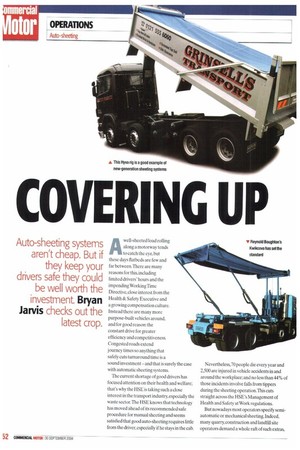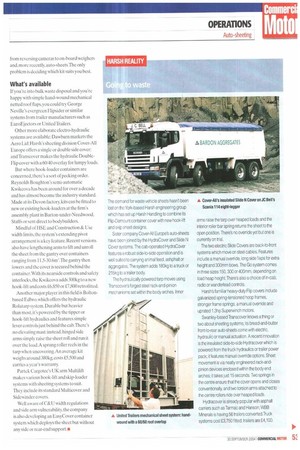COVER NG UP
Page 54

Page 55

If you've noticed an error in this article please click here to report it so we can fix it.
Awell-sheeted load rolling along a motorway tends to catch the eye, but these days flatbeds are few and far between.There are many reasons for this, including limited drivers' hours and the impending WorkingTime Directive, close interest from the Health & Safety Executive and a growing compensation culture. Instead there are many more purpose-built vehicles around, and for good reason: the constant drive for greater efficiency and competitiveness. Congested roads extend journey times so anything that safely cuts turnaround time is a sound investment — and that is surely the case with automatic sheeting systems.
The current shortage of good drivers has focused attention on their health and welfare; that's why the HSE is taking such a close interest in the transport industry, especially the waste sector. The HSE knows that technology has moved ahead of its recommended safe procedure for manual sheeting and seems satisfied that good auto-sheeting requires little from the driver, especially if he stays in the cab. Nevertheless, 70 people die every year and 2,500 are injured in vehicle accidents in and around the workplace; and no less than 44% of those incidents involve falls from tippers during the sheeting operation.This cuts straight across the HSE's Management of Health and Safety at Work regulations.
But nowadays most operators specify semiautomatic or mechanical sheeting. Indeed, many quarry, construction and landfill site operators demand a whole raft of such extras, from reversing cameras to on-board weighers and, more recently. auto-sheets.The only problem is deciding which kit suits you best.
What's available
If you're into bulk waste disposal and you're happy with simple hand-wound mechanical netted roof flaps, you could try George Neville's evergreen Flipsider or similar systems from trailer manufacturers such as EuroEjectors or United Trailers.
Other more elaborate elcctro-hydraulic systems are available: Dawbarn markets the Aero Lid: Harsh's sheeting division Cover-All Europe offers a single or double side cover: and Transcover makes the hydraulic DoubleFlip cover with a 60/40 overlay for lumpy loads.
But where hook-loader containers are concerned, there's a sort of pecking order. Reynolds Boughton's semi-automatic Kwikcova has been around for over a decade and has almost become the industry standard. Made at its Devon factory, kits can be fitted to new or existing hook-loaders at the firm's assembly plant in Barton-under-Needwood. Staffs or sent direct to bodybuilders.
Mindful of HSE and Construction & Use width limits, the system's extending pivot arrangement is a key feature. Recent versions also have lengthening arms to lift and unroll the sheet from the gantry over containers ranging from 11.5-30.6m3.The gantry then lowers and the cover is secured behind the container.With its nearside controls and safety interlocks, the Kwikcova adds 300kg to a new hook-lift and costs £6,850 or £7,800 retrofitted.
Another major player in this field is Boltonbased Edbro. which offers the hydraulic Rolatarp system. Durable but heavier than most, it's powered by the tipper or hook-lift hydraulics and features simple lever controlsjust behind the cab.There's no elevating mast:instead, hinged side arms simply raise the sheet roll and run it over the load.A sprung roller reels in the tarp when uncovering.An average kit weighs around 380kg,costs £5,500 and carries a year's warranty.
Partek Cargotec's UK arm Multilift makes various hook-lift and skip-loader systems with sheeting systems to suit. They include its standard Multicover and Sidewinder covers.
Well aware of C&U width regulations and side arm vulnerability, the company is also developing an EasyCover container system which deploys the sheet but without any side or rear-end support.. The demand for waste vehicle sheets hasn't been lost on the York-based Harsh engineering group which has set up Harsh Handling to combine its Flip-Demount container cover with new hook-lift and skip sheet designs.
Sister company Cover-All Europe's auto-sheets have been joined by the HydraCover and Slide N Cover systems. The cab-operated HydraCover features a robust side-to-side operation and is well suited to carrying animal feed, ashphalt or aggregates. The system adds 180kg to a truck or 215kg to a trailer body.
The hydraulically powered tarp moves using Transcover 's forged steel rack-and-pinion mechanisms set within the body arches. Inner arms raise the tarp over heaped loads and the interior roller bar spring returns the sheet to the open position. There's no override yet but one is currently on trial.
The two electric Slide Covers are back-to-front systems which move on steel cables. Features include a manual override, long side flaps for extra height and 300rnm bows. The Go system comes in three sizes:150,300 or 400mm, depending on load heap height. There's also a choice of in-cab, radio or wandedead controls.
Harsh's familiar heavy-duty Flip covers include galvanized spring-tensioned hoop frames, stronger frame springs, a manual override and uprated 1.3hp Superwinch motors.
Swanley-based Transcover knows a thing or two about sheeting systems; its bread-and-butter front-to-rear auto-sheets come with electric, hydraulic or manual actuation. A recent innovation is the insulated side-to-side Hydracover which is powered from the truck hydraulics or trailer power pack; it features manual override options. Sheet movement is via neatly engineered rack-andpinion devices enclosed within the body end arches; it takes just 15 seconds. Two springs in the centre ensure that the cover opens and closes conventionally, and two torsion arms attached to the centre rollers ride over heaped loads.
Hydracover is already popular with asphalt carriers such as Tarmac and Hanson; WBB Minerals is having 56 trailers converted Truck systems cost £3,750 fitted; trailers are £4,100.


































































































































































































